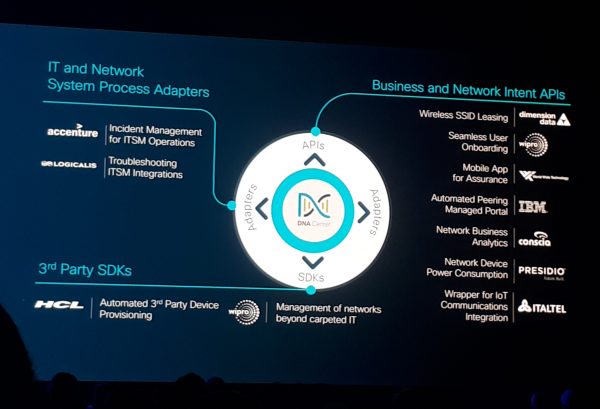ORLANDO — Many of the world’s aging networks are expensive, fragmented, and sometimes vulnerable to attacks, but Cisco Systems is hoping its latest decision to make its intent-based network platforms open, allowing for the management of third-party devices, will help solve a lot of those problems.
The San Jose tech company’s Digital Network Architecture (DNA), a software-driven approach to networks, along with its control software, DNA Center, will give its partners an opportunity to dabble with APIs and develop new applications for customers, said Sachin Gupta, senior vice-president of product management for enterprise networking at Cisco.
“We’re making it easy for more people without complete networking knowledge to leverage the power of the network,” he said during Cisco Live 2018.
Launched last year, DNA Center allows network operators to react to business needs and security threats across their entire network much faster. And as the world of IoT continues to explode – Gartner predicts that more than 20 billion devices will be connected to the internet by 2020 – it only made sense to make DNA Center an open platform for network innovation, said Gupta.
Opening the DNA Center to third-party developers – which will happen this summer – makes it easier to, for example, validate and even automate certain functions of an entire network upon deployment, said Paul Giblin, senior solutions architect at Presidio, a Cisco partner based in New York.
“You could have done an application like this in the past, but it would have taken a lot of custom code and fidgeting, and it probably wouldn’t be very secure or stable,” he said. “Now, with a single set of APIs to write to, it makes it much easier. But you can’t just stay at the app developer level. You must understand what a network does and how it provides the services people want. It’s a new way to go out and do the job you used to do.”

Presidio joins Dimension Data, World Wide Technology, Wipro and Logicalis, and 10 other companies offering integrations and applications on top of the DNA Center at launch.
Preparing for the inevitable tidal wave of IoT devices and smart cities is a hot topic in enterprise boardrooms and among service providers, many of whom have multi-vendor networks, said Sumeet Arora, SVP of Engineering. And Cisco is prepared for that, he said.
“I will say that you should build your infrastructure with Cisco products, but an important element here is to deliver services to enterprises together. SPs are a huge go-to market channel for us, and the DNA center plays a big role in being able to do that,” he said.
Cisco isn’t alone in the intent-based networking arena, but Prashanth Shenoy, vice-president of product marketing and enterprise networking for Cisco, says its built-in security features that detect vulnerabilities and abnormal application behaviours sets them apart. And while some analysts suggest enterprises should shift investments away from network vendors and instead focus on their existing network personnel when it comes to network innovation, Shenoy said Cisco’s dedication to its growing community platform DevNet, is a clear sign they are a legitimate go-to source for network innovation.
“We’ve built a community platform to help people learn how to code, test those codes and exchange ideas. It’s not just about the technology. It’s also about providing that ecosystem of partners, the platform and the training, in order to make adoption successful,” he said.
